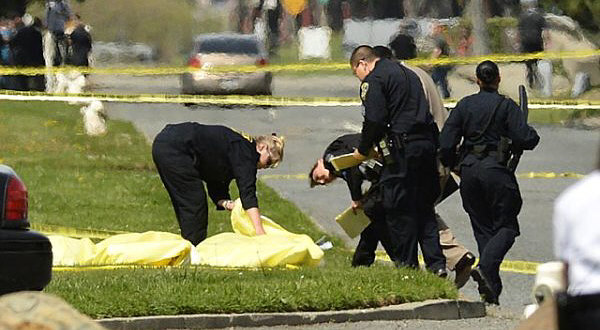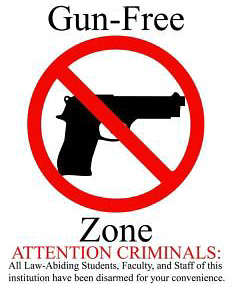

Can Government Officials Be
Trusted With Our Children's Lives

By Rob Morse. March 13, 2020
Original Source
I’m watching the news media and the government go nuts over the flu. That increased my level of skepticism about our public institutions. That was my frame of mind when Bill Frady asked me, “Didn’t we learn what to do from the first school attacks? Why was there ever a second school shooting in the USA?” Bill asked the right question under the right circumstances, and I think Bill is right. We should have learned from the first attack, but we didn’t. We know how to stop mass public violence, but, too often, we chose not to. Fortunately, recent news helps us figure out what happened. Attacks in public are rare and hard to understand. We pay for preparation every day, but the reward may never come. We make excuses when we fail, and we don’t get credit when we succeed. All of that plays a part. Government has trouble filling a pothole. Sometimes it needs our help to do the right thing.
Practice is a better teacher than theory:
Some problems are easy to solve. You know how to feed yourself and you solve that problem several times a day. You learned what a solution looks like when you were a child. You practiced taking care of yourself as a teenager. In contrast, we don’t have that familiarity with rare events like a school or church attack. We didn’t grow up with school and church security. Most of us don’t know how to think about the problem of mass violence, let alone know what to do to solve it in our local schools, churches, or shopping malls. We don’t have a mental model for violence the way we have a model for feeding ourselves at lunch.
We know how to protect our communities, but the solutions are outside our everyday experience. We have to study before we can distinguish the bad proposals from the good ones. The solution is harder to recognize because it may be an assembly of many small factors rather than one quick fix that solves everything.
As a case in point, the school board in Santa Fe, Texas recently allowed selected, trained, volunteer school staff to go armed on campus. The school board reached that decision almost two years after a school in their district was attacked, seven years after the attack at Sandy Hook Elementary school in Connecticut, and almost 21 years after the attack at the high school in Columbine, Colorado. We have to become comfortable with a new idea before we’ll adopt it, and that takes time.
It is psychologically hard to face violence:
Doctor William April studies violent criminals. He says, “To properly plan for violence, you must first admit and accept that the world is not as it ought to be.” We don’t like to think about unpleasant events. You know how it felt to set up a retirement plan, get life insurance, get flood insurance, and write a will. If you don’t know how that feels, then you made my point for me, and please take care of yourself and your future.
We put off those tasks because they remind us of unpleasant possibilities, and because we can. We ignored the problem yesterday, and we saw the sun come up today.. if we’re lucky.
Many of us are distressed by reality. Thinking about evil is depressing. If getting insurance made you uncomfortable, then hold onto your emotions when you think about stopping the murder of children. Thinking about the worst possible events can be emotionally painful. To make matters worse, we ignore our small successes.
I’ve seen churches easily respond to an accident in the parking lot because they had prepared to face larger emergencies. The church volunteers and the church governing board deserve praise for their rapid response and the increased level of care they were able to provide. They seldom get the credit they deserve.
It is hard to deal with rare events:
It is hard to work for something that has a payoff in the distant future. That is a truth, and if you doubt me then look at how hard it is for most of us to lose a few pounds. We know what we should do to lose weight, but the reward of better health and a longer life comes years from now, while the cost of shedding weight is paid at every meal and at every workout session. Likewise, the emotional and physical costs to protect our kids are paid every day. The reward of preventing or minimizing an attack will only come at in some undefined moment in the future.
 The pain is real. The thought that there is evil in the world is uncomfortable, and some people experience that discomfort every time they see a sign that says ‘school staff may be armed.’ They are willing to trade dead kids in the future in order to avoid the discomfort of recognizing evil today. Some people are angry at those of us who recognize evil.
The pain is real. The thought that there is evil in the world is uncomfortable, and some people experience that discomfort every time they see a sign that says ‘school staff may be armed.’ They are willing to trade dead kids in the future in order to avoid the discomfort of recognizing evil today. Some people are angry at those of us who recognize evil.
Most of us have pleasant memories of going to school. These angry people are saying, ‘Don’t put those ugly walls around my happy place. Won’t the problem simply go away if we close our eyes and wish real hard?’ In a perverse inversion of incentives, they will have a lot of company and sympathy if their undefended school is attacked.
We find it hard to blame people who refused to prepare:
I have friends who ride out floods, hurricanes, and fires with ease because they planned ahead. Likewise, some friends study self-defense and trauma care. In contrast, we donate time and money to help the victims who didn’t prepare. Of course our heart goes out to the victims of mass murder since they didn’t deserve such an attack. I think we also owe a debt of gratitude to those who put plans in place today so they could ride out those storms. Give thanks to the people who prevent and minimize the damage caused by an attack on our schools and churches. We owe them that.
Government is only as smart as we are:
Preventing mass public violence is controversial. Our bureaucratic system isn’t designed to make unpopular decisions. That means politicians can only go where we lead them. A politician may make the correct decision, but be criticized by people who have not studied the problem as much as he has, or as much as you have. You have to speak up, or someone else will.
There are lots of easy answers out there but few of them help. Politicians are often rewarded for doing the wrong thing. A popular but ineffective solution may solve the political problem today, but worsen the long-term security problem. We’ve seen some communities proudly leave their children undefended even after an attack in their community.
In contrast, other communities faced the reality of evil and learned to prevent and minimize violent attacks on their kids. Some of those preparations, like armed volunteer staff, cost almost nothing. At the other end of the spectrum, better mental health programs are expensive but provide payback for years, if not for generations. We need both.
How long should we wait to face our problems? I’ve seen churches build a security team in a week, with help. We can pay now, or we can pay later. That is up to us since we are the conscience of our body politic. Our politicians can’t solve a problem until we recognize the solution. It is up to us to remind our politicians and bureaucrats to do the right thing.
Have you told your politician what to do to make our society safer?
~_~_
I gave you twelve hundred words. Please share them with a friend. RM
Sources-
http://lockandloadradio.com/
https://www.youtube.com/channel/UCmXX29kyKCiP_jEWw0I5xpw/videos
https://www.click2houston.com/news/local/2020/03/07/santa-fe-isd-to-enact-guardian-program-allowing-teachers-to-bring-guns-in-classroom/
https://aprillriskconsulting.com/
https://fastersaveslives.org/
https://i2i.org/faster-training/
https://www.nationalreview.com/news/parkland-families-rip-school-board-election-results/
https://www.wlrn.org/post/recount-results-incumbent-keeps-seat-broward-school-board-against-parkland-parent#stream/0
https://fbsnamerica.com/
![]()

























